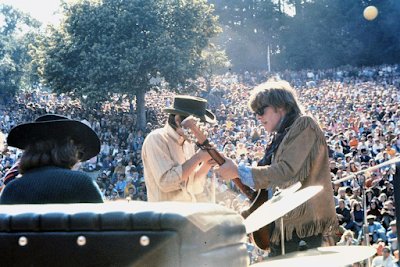The Summer of Love and Janis Joplin
By Shannon Stockwell
The Monterey International Pop Festival was the event that truly kicked off the Summer of Love in 1967 and launched the career of soul singer Janis Joplin, the focus of A Night with Janis Joplin, running through July 9 at The Geary Theater.
The festival proved to be a turning point in Joplin’s career, but the organizers struggled to get her band, Big Brother and the Holding Company, and other San Francisco bands (including Jefferson Airplane) to agree to perform. The groups were infused with the culture of Haight-Ashbury and were against stardom, fame, and profit. They only agreed to play the festival after intense questioning about where the money was going. In the end, the festival was a huge success. A reported 90,000 people enjoyed the music and the perfect weather.
The rest of the summer was one long celebration filled with spontaneous concerts, protests, and public performances. “Every day was a parade, a procession,” says Stanley Mouse, an artist who became renowned for his psychedelic ’60s posters. New arrivals showed up all summer long, lured by the feeling that a revolution was underway and wanting desperately to be a part of it.
Not all of San Francisco was smitten with the hippies. Conservative San Francisco Chronicle editorials painted a dark picture of the new lifestyle, and transport officials, police officers, and government administrators denounced the long-haired migrants. When city officials refused to help manage the sudden population increase, the Haight-Ashbury community created its own social services, such as housing aid, legal assistance, and a free medical clinic that remains in operation today. For a few months in 1967, notions of a free society that may once have been dismissed as idealistic or romantic seemed attainable.
But by the end of the summer, the scene had soured. It had become flooded by young people interested in sexual and psychotropic experimentation but not in the hippies’ spiritual doctrine of love and understanding. The police were cracking down on drug possession, and tourists now took buses through the neighborhood to ogle this foreign subculture as though its members were animals in a zoo. The hippies knew it was time to move on. In October, performance artists held a funeral procession for “Hippie, devoted son of Mass Media,” and many hippies either returned home or moved north to Marin County.
The Summer of Love may have ended, but there was no stopping the cultural revolution from continuing elsewhere. The events of 1967 in Haight-Ashbury brought hippiedom into the mainstream, leading to sexual liberation, increased awareness of environmental issues, and the abolishment of the military draft, among many other changes. Now, 50 years later, A.C.T. celebrates and remembers that summer with the story of the woman whose music formed the soundtrack to it all: Janis Joplin.
A Night with Janis Joplin runs through July 9 at The Geary Theater. Click here to purchase tickets through our website. Want to learn more about the hippie movement and Janis Joplin? Click here to purchase Words on Plays, A.C.T.’s in-depth performance guide series.
The Monterey International Pop Festival was the event that truly kicked off the Summer of Love in 1967 and launched the career of soul singer Janis Joplin, the focus of A Night with Janis Joplin, running through July 9 at The Geary Theater.
 |
| Jefferson Airplane playing at a festival in Marin County, California, 1967. Photo by Bryan Costales. Courtesy Wikimedia Commons. |
The rest of the summer was one long celebration filled with spontaneous concerts, protests, and public performances. “Every day was a parade, a procession,” says Stanley Mouse, an artist who became renowned for his psychedelic ’60s posters. New arrivals showed up all summer long, lured by the feeling that a revolution was underway and wanting desperately to be a part of it.
Not all of San Francisco was smitten with the hippies. Conservative San Francisco Chronicle editorials painted a dark picture of the new lifestyle, and transport officials, police officers, and government administrators denounced the long-haired migrants. When city officials refused to help manage the sudden population increase, the Haight-Ashbury community created its own social services, such as housing aid, legal assistance, and a free medical clinic that remains in operation today. For a few months in 1967, notions of a free society that may once have been dismissed as idealistic or romantic seemed attainable.
 |
| The Who, San Francisco, 1967. Photo by James Vaughan. Courtesy Flickr. |
The Summer of Love may have ended, but there was no stopping the cultural revolution from continuing elsewhere. The events of 1967 in Haight-Ashbury brought hippiedom into the mainstream, leading to sexual liberation, increased awareness of environmental issues, and the abolishment of the military draft, among many other changes. Now, 50 years later, A.C.T. celebrates and remembers that summer with the story of the woman whose music formed the soundtrack to it all: Janis Joplin.
A Night with Janis Joplin runs through July 9 at The Geary Theater. Click here to purchase tickets through our website. Want to learn more about the hippie movement and Janis Joplin? Click here to purchase Words on Plays, A.C.T.’s in-depth performance guide series.

